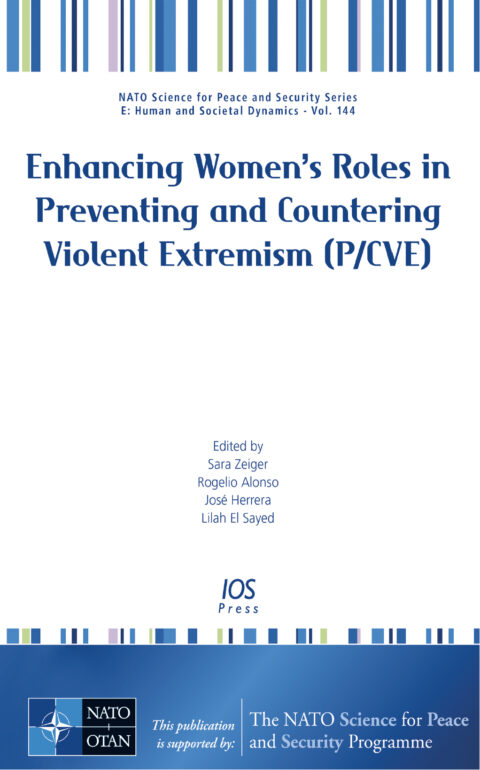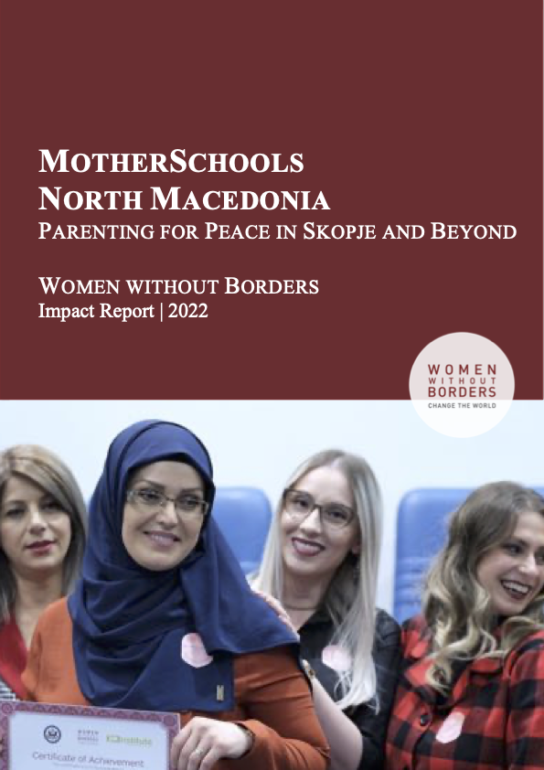Between 2021 and 2023, Women without Borders (WwB) implemented its ‘MotherSchools: Parenting for Peace’ programme across Kerala as part of a multi-country project supported by the L’Oréal Fund for Women. Now, a second follow-on project is being supported by the L’Oréal Fund for Women and will run from 2023 until 2026 with three rounds of MotherSchools in Kerala. WwB previously implemented MotherSchools in five vulnerable communities across Mewat. These original MotherSchools India iterations (2013–2014) engaged mothers across 8 groups in the villages of Salamba, Satputiyaka, Khedla, Tain, and Nuh.
Women without Borders (WwB) first brought its ‘MotherSchools: Parenting for Peace’ model to India in 2013 and 2014, with mothers across 8 groups in 5 Mewati communities. This initial round was followed by the ‘MotherSchools on Air’ community radio initiative in 2014, spreading awareness of the insights learned in the sessions to approximately 200 villages. In 2021, WwB returned to India with three roll-outs between 2021 and 2023 as part of a multi-country project supported by the L’Oréal Fund for Women. This time in the region of Kerala, the three roll-outs concluded in 2021, 2022, and 2023 respectively, seeing hundreds of mothers join the global pool of MotherSchools graduates. A second multi-country project was started in 2023 in Kerala, foreseeing three roll-outs between 2023-2026. The below sections outline the details and impact of the 2013-2014 MotherSchools round in Mewat, as well as the key points of the 2021-2023 and 2023-2026 projects in Kerala.
To date, WwB has hosted five Graduation ceremonies in India. Prominent speakers have included: Ambassador Katharina Wieser (Austrian Ambassador to India, Bangladesh, Bhutan, Maldives, Nepal and Sri Lanka), Mr. Hibi Eden (Member of Parliament), Ms. Sheeba Lal (Counself and Welfare Standing Committee Chairperson of Cochin Corporation), Ms. Lida Jacob I A S (Former Secretary of Govt. of Kerala), Dr. Latha Nair R (Associate Professor), Ms. Proonima Indrajith (actress and entrepreneur), Mr. M Anil Kumar (Mayor of Cochin Corp.), Ms. Anita Pratap (author and journalist), Ms. Claudia Reinprecht (Austrian Ambassador to UNESCO), Ms. Aswathy Sreekanth (Indian Actor, ICF Level II Certified Life Coach), Ms. Roopa George (Entrepreneur, Environmentalist, Social Worker, Humanitarian), Dr. Leela Manjooran (Retired Professor of Politics, St. Teresa’s College, Ernakulam), Mallika Sukumaran (Indian Cine Artist), and Teresa Verghese (Director, Krythium Solutions Private Limited).
MotherSchools Kerala | 2023–ongoing
MotherSchools India are continuing in Kerala as part of a second three-year multi-country project supported by the L’Oréal Fund for Women, once again with local partner Fourth Wave Foundation (FWF). The first round, from 2023-2024, focused on widowed mothers in India, a particularly vulnerable group, long overlooked by Indian society. 5 groups in total met weekly over 10 weeks in the municipalities of Ernakulum, Idukki, Palakkad, Thrissur, and Trivandrum, holding the Graduation ceremony in April 2024. A second iteration took place throughout 2025, seeing 5 groups convene in the municipalities of Alappuzha, Ernakulum, Kannur, Thrissur, and Trivandrum. The Graduation ceremony was in November 2025. The third and final iteration is planned for 2026, with another 5 groups rolling out across municipalities in Kerala.
The three-year project will also see implementation of MotherSchools in Bangladesh, Kosovo, North Macedonia, and Zanzibar.
MotherSchools Kerala | 2021–2023
In 2021, WwB brought its global Parenting for Peace programme back to India in cooperation with its local implementing partner Fourth Wave Foundation (FWF). Reaching the state of Kerala this time, the MotherSchools implementation is part of a multi-country project supported by the L’Oréal Fund for Women. This project, recently concluded in India with a final Graduation ceremony in March 2023, also includes programmes in Bangladesh, Kosovo, and Zanzibar.
The first round in 2021 was carried out in Chellanam across 5 groups and paved the way for future iterations of MotherSchools groups in the region. As such, the second rollout in 2022 saw another five groups across the district of Ernakulam, in the villages of Chellanam, Angamaly, and Koratty. The third and final iteration in 2023 took place in five groups across Edanad, Kumbalangi, Trivandrum, Vengoor, and Vimalagiri. The culmination of all three rounds of MotherSchools was marked by formal Graduation ceremonies that celebrated the achievements of the MotherSchools Participants, Teachers, and Notetakers.
The increasing interest in MotherSchools within Kerala reflects a growing awareness among mothers of the threat of violent extremism, as well as of the important role they play in addressing radicalisation. WwB expects further engagement in the coming years, aiming to bring more MotherSchools rounds to Kerala, India.
MotherSchools Mewat | 2013–2014
Mewat is a remote, and an economically and culturally isolated part of India situated near New Delhi and Gurgaon. The region has a Muslim majority population where Tablighi Jamaat, an Islamic movement that has been linked to violent extremist groups, previously gained ground. The movement succeeded in capitalising on widespread poverty and low literacy rates, which has contributed to the female population being confined to their homes; many of them have never left their villages, let alone boarded a bus. At male to female population and literacy ratios of 1000:906 and 7:3 respectively, Meo women by no means are a minority but nevertheless are afforded far fewer opportunities to become independent and have a say in private and public decisions. Fieldwork interviews revealed that they feel overwhelmed by the lack of respect for their gender, and by the everyday violence with which they are confronted in their homes and communities. The region more generally has been viewed as vulnerable to extremist influences. Most notably, one of the perpetrators of the 2008 Mumbai attacks (commonly referred to as 26/11) is suspected to have been recruited from Mewat.
Seeking to break this cycle of isolation on the one hand, and to tackle domestic violence and violent extremism by building up the confidence and skills to harness the security potential of the female population on the other hand, Women without Borders rolled out the first Indian iteration of its ‘MotherSchools: Parenting for Peace’ programme in vulnerable areas across Mewat. In cooperation with SMART as local implementing partner, WwB MotherSchools engaged mothers across 8 groups in the villages of Salamba, Satputiyaka, Khedla (two groups), Tain (two groups), and Nuh (two groups) between October 2013 and February 2014.
MotherSchools in Mewat provided a trusted space for mothers in the community, many of whom have had limited opportunities to voice their concerns among their peers. In the course of the programme, the Mewati participants gained greater self-confidence and self-awareness, and they developed a deeper understanding of how to apply the learnings from WwB’s MotherSchools curriculum in their households and neighbourhoods. Against the background of widespread poverty and limited prospects, the mothers welcomed from the outset the opportunity to gain an education that could help to anchor their children and steer them in the right direction. A number of attendees had never received a formal education prior to their participation in the MotherSchools programme. WwB’s ‘Parenting for Peace’ philosophy proved to resonate with the mothers. They demonstrated great enthusiasm for acquiring skills and knowledge that promised to improve a mother’s relationships with her adolescent children and position them as local security actors.
For many participants, the MotherSchools offered a platform to speak and be heard in a group setting for the first time in their lives. Following the completion of a number of cycles, WwB recognised the need to bring the MotherSchools programme’s successes and the stories of its recent graduates to the attention of the wider community. WwB thus continued its work with its LIP to supplement the programme with the ‘MotherSchools on Air’ community radio initiative. In September 2014, WwB and its local partner co-organised a training at the Austrian Embassy in New Delhi for grassroots reporters and participants from the first MotherSchools cycle in Mewat. They were taught to record their learnings, messages, and individual narratives for dissemination via the radio programme. The radio signal covered a twenty-five-kilometre radius and reached some two hundred villages.
While WwB’s weekly MotherSchools meetings provided the content for the programme, SMART made available the necessary equipment and offered technical training. Two reporters attended the subsequent WwB MotherSchools cycles to record additional material, and participants also came by the radio station or gave phone interviews. The combined efforts of WwB and its LIP resulted in two weekly radio programmes. Each episode had a unique theme, featured between seven and eight mothers, and left sufficient time for listeners to call in with questions. This initiative succeeded in amplifying MotherSchools successes by continuing to empower the participants’ voices and helping to address taboo topics while challenging patriarchal structures at the local level.



